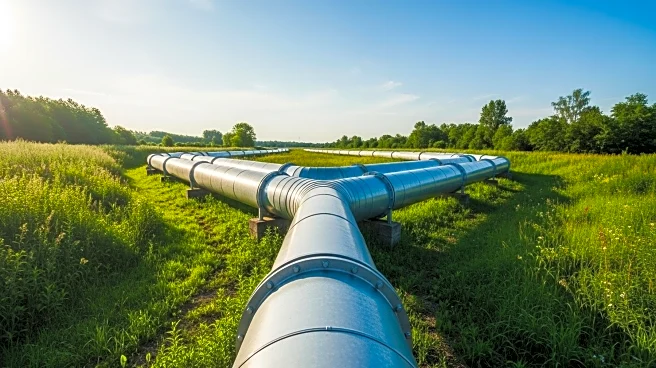What's Happening?
A new carbon sequestration pipeline project connecting Colorado and Nebraska has become operational, raising concerns in Iowa about its impact on the state's ethanol production status. Iowa, currently the leading ethanol producer in the U.S., faces potential market challenges as the Nebraska project could open new markets for ethanol, particularly in states like California where low carbon intensity ethanol is in demand. Monte Shaw, Executive Director of the Iowa Renewable Fuels Association, emphasized the need to grow demand to avoid economic repercussions in Iowa and the Midwest. Steve Kuiper from the Iowa Corn Growers Association noted that increased ethanol production could lead to higher competition for corn, potentially benefiting farmers with better prices. However, some Iowa landowners remain opposed to similar pipeline projects, citing safety concerns and regulatory disputes.
Why It's Important?
The operational status of the Nebraska pipeline project could shift the dynamics of the ethanol market, affecting Iowa's economy significantly. Iowa's farmers and ethanol producers might face increased competition, potentially leading to higher corn prices but also risking Iowa's top producer status. The situation underscores the importance of balancing production and demand to maintain economic stability in the region. Additionally, the regulatory battle over pipeline safety standards and land use authority highlights ongoing tensions between federal and local governance, which could set precedents for future infrastructure projects.
What's Next?
The U.S. Supreme Court may soon decide whether to hear a case involving Summit Carbon Solutions and two Iowa counties over pipeline regulation. This decision could influence future pipeline projects and regulatory frameworks, impacting local landowners and state authorities. Stakeholders in Iowa are likely to continue advocating for their interests, whether in support of or opposition to pipeline developments, as the market and legal landscapes evolve.
Beyond the Headlines
The development of carbon sequestration pipelines reflects broader environmental and economic shifts towards sustainable energy solutions. As states like California demand low carbon intensity ethanol, the pressure on traditional ethanol producers to adapt increases. This could lead to long-term changes in agricultural practices and energy production, with implications for environmental policy and rural economies.











